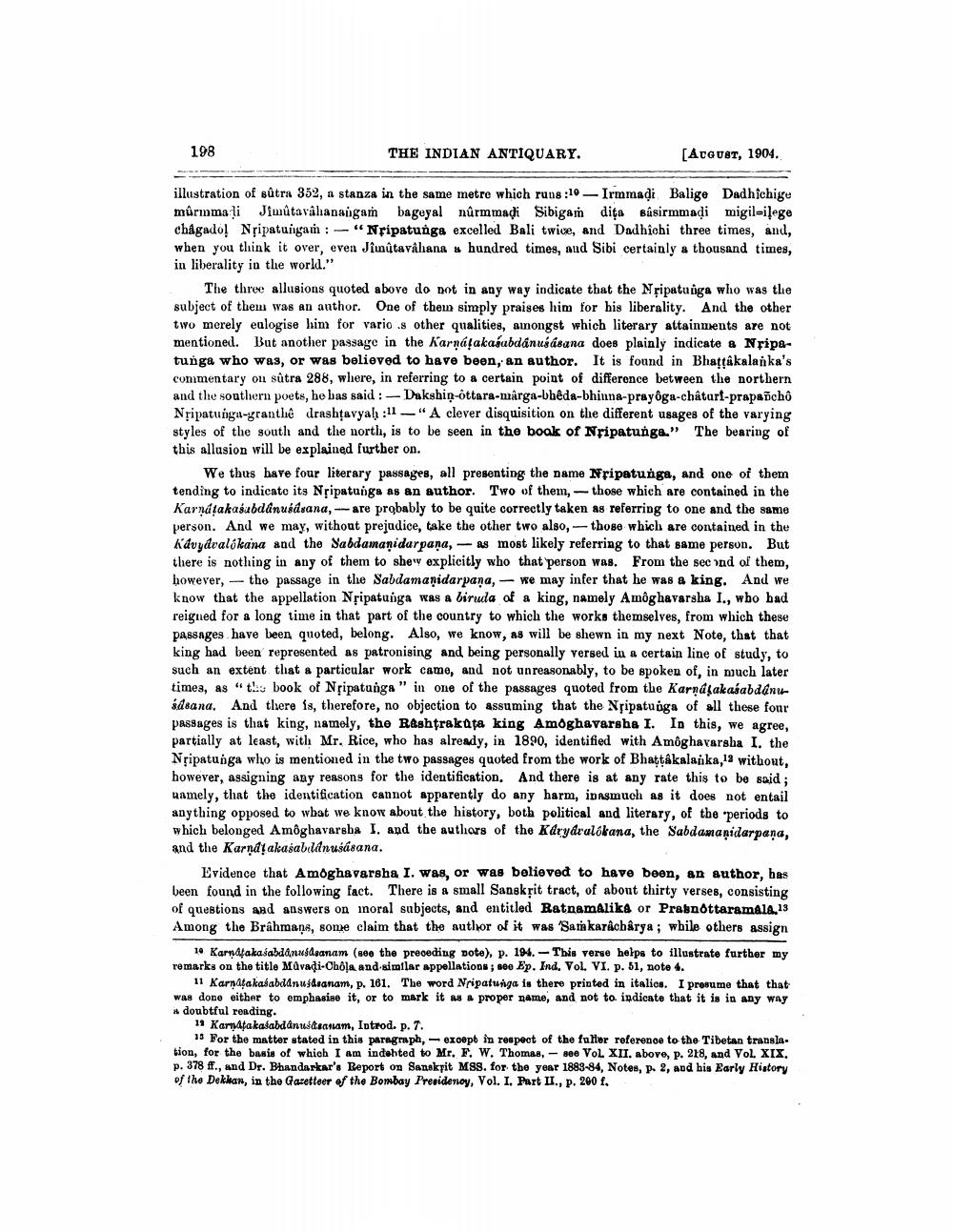________________
198
THE INDIAN ANTIQUARY.
[Acoust, 1904.
illustration of sûtra 352, a stanza in the same metre which runs :10 — Irmmadi Balige Dadhichige mürmmaļi Jimůtavahanangam bagegal nûrmmadi Sibigam dita susirmmadi migil-ilege chågado! Nripatungam: - "Nripatunga excelled Bali twice, and Dadhichi three times, and, when you think it over, even Jiunútaváhana # hundred times, and Sibi certainly a thousand times, in liberality in the world."
The three allusions quoted above do not in any way indicate that the Npipatunga who was the subject of them was an author. One of them simply praises him for his liberality. And the other two merely ealogise him for vario .s other qualities, amongst which literary attainments are not mentioned. But another passage in the Karnáļakasabdánu ásana does plainly indicate a Nripatunga who was, or was believed to have been, an author. It is found in Bhattakalanka's commentary ou sútra 288, where, in referring to a certain point of difference between the northern and the southern poets, he bas said :-Dakshin-óttara-marga-bheda-bhinna-prayôga-châturf-prapancho Nripatunga-granthe drashțavyah :11 - "A clever disquisition on the different usages of the varying styles of the south and the north, is to be seen in the book of Nripatunga." The bearing of this allusion will be explained further on.
We thus have four literary passages, all presenting the name Nripatunga, and one of them tending to indicato its Nripatunga as an author. Two of them, - those which are contained in the Karnatakaśubdanubásana, --- are probably to be quite correctly taken as referring to one and the same person. And we may, without prejudice, take the other two also, - those which are contained in the K'duydvalókana and the Sabdamanidar pana, as most likely referring to that same person. But there is nothing in any of them to shev explicitly who that person was. From the second of them, however, the passage in the Sabdamanidarpana, - we may infer that he was a king. And we know that the appellation Nripatunga was a birua of a king, namely Amôg havarsha I., who had reigned for a long time in that part of the country to which the works themselves, from which these passages have been quoted, belong. Also, we know, as will be shewn in my next Note, that that king had been represented as patronising and being personally versed in a certain line of study, to such an extent that a particular work came, and not unreasonably, to be spoken of, in much later times, as "the book of Nipatunga" in one of the passages quoted from the Karnáļakasabdanu śdsana. And there is, therefore, no objection to assuming that the Nripatunga of all these four passages is that king, namely, the Rashtrakata king Amoghavarsha I. In this, we agree, partially at least, with Mr. Rice, who has already, in 1890, identified with Amoghavarsha I. the Nripatunga who is mentioned in the two passages quoted from the work of Bhattákalanka 1a without, however, assigning any reasons for the identification. And there is at any rate this to be said; uamely, that the identification cannot apparently do any harm, inasmuch as it does not entail anything opposed to what we know about the history, both political and literary, of the periods to which belonged Amoghavarsha I. and the authors of the Kdrydralókana, the Sabdanaạidarpana, and the Karnatakasabdánuśásana.
Evidence that Amoghavarsha I. was, or was believed to have been, an author, has been found in the following fact. There is a small Sanskrit tract, of about thirty verses, consisting of questions and answers on inoral subjects, and entitled RatnamAlika or Prabnottaramala.13 Among the Brâhmans, some claim that the author of it was 'Sari karacharya ; while others assign
• Karnatakasabdanufdsanam (see the preceding bote), p. 194. - This verse helps to illustrate further my remarks on the title Mavadi-Ohola and similar appellations, see Ep. Ind. VOL. VI. p. 51, note 4.
11 Karnatakasabadnuidsanam, p. 161. The word Nripatunga is there printed in italics. I presume that that was done either to emphasise it, or to mark it as a proper name, and not to indicate that it is in any way a doubtful reading.
11 Karnatakaśabdanutsanam, Introd. p. 7.
15 For the matter stated in this paragraph, - except in respect of the fuHer reference to the Tibetan transla. tion, for the basis of which I am indehted to Mr. F, W. Thomas, - 80 VOL. XII. above, p. 218, and Vol. XIX. p. 378 ff., and Dr. Bhandarkar's Report on Sanskrit MSS. for the year 1889-84, Notes, P. 2, and his Early History of the Dekhan, in the Gazetteer of the Bombay Presidenoy, Vol. I. Part II., P. 200 f.




